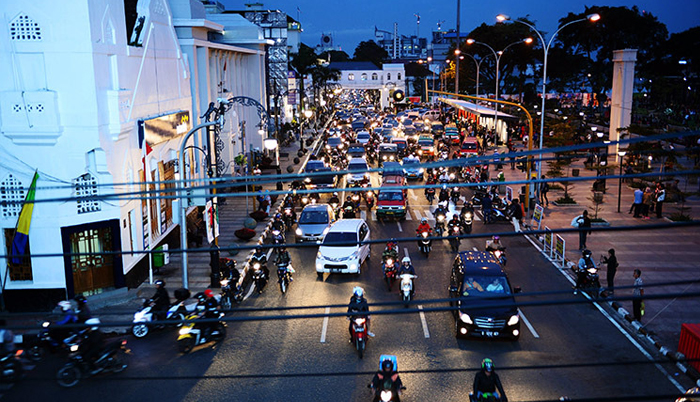![]() Home > World Business
Home > World Business
Indonesia Set For Trillion-Dollar Economy In Bittersweet Triumph

Photographer: Dimas Ardian/Bloomberg
![]() October 16th, 2017 | 14:21 PM |
October 16th, 2017 | 14:21 PM | ![]() 570 views
570 views
INDONESIA
Indonesia is on track to become a trillion-dollar economy and should be the envy of Southeast Asia. Yet on some key measures, the region’s biggest economy is falling behind.
The nation lags its neighbors on infrastructure development, faces a fiscal shortfall that’s heaping pressure on the state budget and still has 28 million people living in poverty. That’s even after reforms saw the economy’s value more than double over the past decade to $932 billion, with President Joko Widodo’s government forecasting growth this year of about 5 percent.
Size isn’t everything. Even after eight rate cuts since the beginning of last year, the economy is struggling to fire up: loan growth remains muted, while the central bank expects low inflation to linger for some time. The picture is made more complex by a wide divergence in growth across the archipelago of more than 17,000 islands, with rates ranging from negative to more than 7 percent.
“This is a pretty large economy that has a lot of potential but the trick really is how to get to that place where growth becomes more sustainable at relatively elevated levels. That’s more important than the overall size of the economy,” said Euben Paracuelles, an economist at Nomura Holdings Inc. in Singapore. “From that perspective, their work is cut out for them.”
Sustaining growth is crucial to luring overseas investors, who are returning to Indonesia 20 years after the Asian financial crisis. Foreign reserves are at a record high of $129 billion while bond market inflows are near record levels. S&P Global Ratings in May joined the other two main rating companies in awarding Indonesia investment grade status, citing a more prudent approach to budgets.
Graduation into the trillion dollar club “signifies how Indonesia now is laddering up in the middle-income group,” said Perry Warjiyo, deputy governor at Bank Indonesia. “Under the leadership of President Joko Widodo, moving in that direction also signifies the fundamentals of the economy are quite strong and resilient.”
The following three charts show the challenges the president -- known as Jokowi -- and his government now face in matching quantity with quality.
Infrastructure Gap
Jokowi is ramping up spending on roads, rail and seaports as he targets economic growth of 5.4 percent in 2018, the fastest rate in five years. But a massive infrastructure deficit -- estimated by the World Bank at $1.5 trillion -- is frustrating his efforts. The global lender says another $500 billion in infrastructure spending is needed over the next five years.
After years of under-investment, the rate of growth in government spending per capita in Indonesia has fallen behind Vietnam, China, India and Malaysia, the World Bank says. Public investments grew at half the pace of the economy from 2005 to 2015 and the quality of infrastructure lags the region and other emerging markets.
Budget Pressure
Indonesia’s tax revenue as a portion of GDP remains one of the lowest in the region with the OECD estimating it at around 12 percent two years ago. It has since fallen to 10.3 percent, which Finance Minister Sri Mulyani Indrawati in July described as “low and unacceptable.” She’s aiming to boost that ratio to 16 percent by 2019.
The shortfall is putting a strain on the budget deficit, which the government is mandated to keep under 3 percent of GDP. The president flagged spending cuts in July when this year’s deficit was revised to 2.9 percent of GDP from 2.4 percent.
The government collected more than $11 billion in penalty payments in a tax amnesty that ended this year, giving citizens a chance to declare assets previously undisclosed to tax authorities. Since then, it’s stepped up efforts to enforce tax rules, which may be also partly responsible for recent weak consumer spending.
Poverty Reduction
While steady progress has been made in reducing poverty, almost 28 million Indonesians are still considered poor. The official poverty rate was 10.6 percent in March, just 0.2 percentage points lower than a year earlier.
A large number of the population remains vulnerable to shocks, with more than 60 million people last year at risk of falling back into poverty, the World Bank said earlier this month. While average monthly wages gained 24 percent in the year through February, higher income earners have been experiencing faster wage growth than lower income groups.
“The environment globally and nationally has been challenging,” said the central bank’s Warjiyo. “Since mid-2015, our economic recovery has been moving up and there had been some improvements in inclusive growth, but more needs to be done.”
Source:
courtesy of BLOOMBERG
by Karlis Salna
If you have any stories or news that you would like to share with the global online community, please feel free to share it with us by contacting us directly at [email protected]